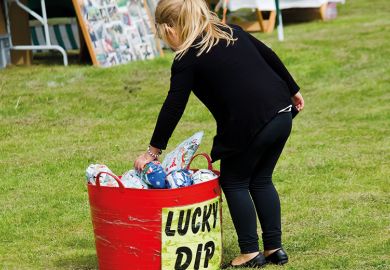Peer review is facing a fresh challenge, with an Australian university network questioning its value for assessing grant applications by junior researchers.
The Innovative Research Universities group says that peer review disadvantages researchers in their early careers, when they rely on competitive grants to cover their salaries and when unsuccessful funding applications “often mark the end of a research idea”.
In a submission to a parliamentary inquiry into research funding arrangements, the IRU says that the benefits of peer-review assessment are countered by “drawbacks” including gender, age and ethnicity biases. The submission adds that peer review by subject-based panels can undermine interdisciplinary research, and also that it “must be balanced against the cost of administration”.
The ideas resonate with moves in Europe, where experts have backed trials of radical approaches such as lottery-style grant allocations or a “universal basic income” for researchers.
The IRU says that grant-awarding bodies could embrace a “mix of methods”. Examples include “funding everybody”, allocating funds at random, or fostering “scientific citizenship” by reserving grants for researchers with avowed commitments to professionalism and open science.
The observations pit the IRU against umbrella group Universities Australia and the prestigious Group of Eight network, both of which have thrown their unqualified support behind peer review.
“Expert peer review should be reaffirmed as the core determinant of excellence for funding the most outstanding and deserving ideas,” Universities Australia insists, while the Go8’s submission says that all types of public research funding should be allocated on the basis of peer review.
But IRU executive director Conor King said that it was “worth questioning” the role of peer review in funding assessments. “I guess we’re opening up the question for debate,” he explained.
“We want to ask the hard questions about when it is worthwhile. A lot of effort goes into this, and we need to be confident that it adds a significant improvement to the outcomes.”
The IRU’s submission says that peer review must achieve demonstrably better outcomes than random allocation “to justify the assessment costs and timeframes”.
But other methods also have drawbacks, it stresses, with data on scientific citizenship “hard to gather”. Grant mechanisms based on “automated impact indices”, which target researchers with the strongest publishing records, help to eliminate favouritism but “can be gamed”.
The submission says that the costs of peer review are “probably justified” for grant schemes targeting established researchers. “However for funding postdoctoral research, the rationale is weak,” the submission says. “Expedient and comprehensive selection processes are important for all competitive grants, but particularly for selecting early career researchers whose careers often depend upon external funding.”
The submission cites Australia’s Discovery Early Career Research Award, which covers salary costs – a lifeline for fledgling researchers lacking tenure. But the selection process takes eight months, and 84 per cent of applications are rejected.
“Unsuccessful Decra applications are more likely to mark the end of a research idea – and potentially a career – than the start of a process of refinement for future applications,” the submission says. It suggests that administration of the scheme be handed over to academic institutions.
Register to continue
Why register?
- Registration is free and only takes a moment
- Once registered, you can read 3 articles a month
- Sign up for our newsletter
Subscribe
Or subscribe for unlimited access to:
- Unlimited access to news, views, insights & reviews
- Digital editions
- Digital access to THE’s university and college rankings analysis
Already registered or a current subscriber? Login








